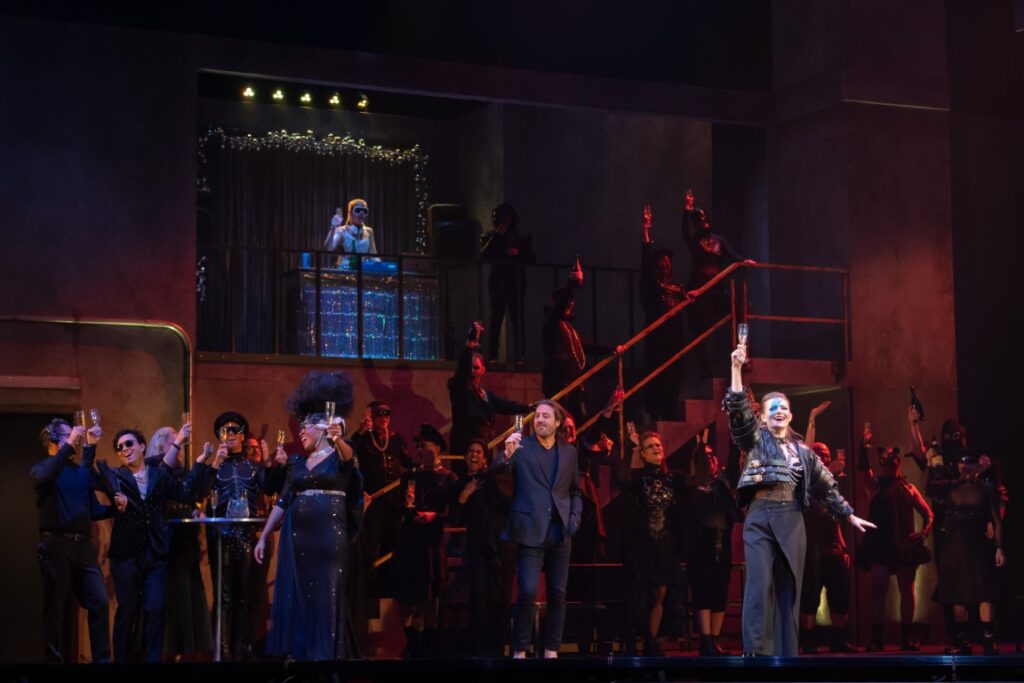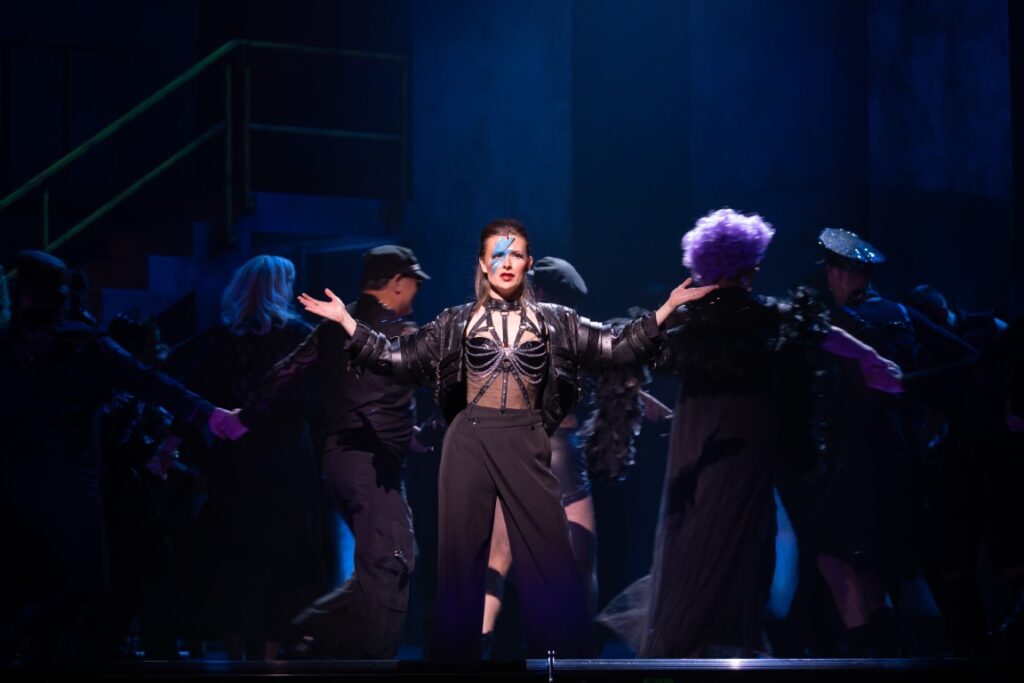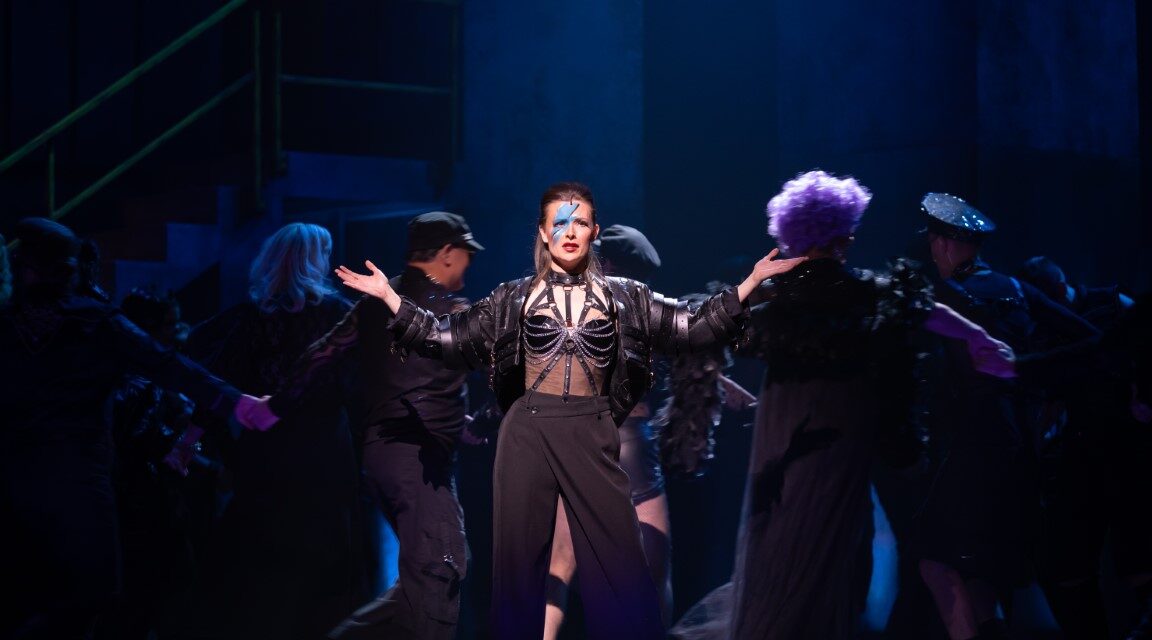
Review by Mark Morris
Photos by Nanc Price
Eisenstein: Adam Luther
Rosalinde: Jonelle Sills
Adele: Karoline Podolak
Orlofsky: Danielle MacMillan
Alfred: John Tessier
Falke: Peter Monaghan
Frosh: Farren Timoteo
Frank: Connor Hoppenbrouwers
Blind: Spencer Lang
Stage Director: Joel lvany
Set and Costume Designer: Patrick Du Wors
Lighting Designer: Jason Hand
Edmonton Symphony Orchestra
Edmonton Opera Chorus (Chorus Director: Shannon Hiebert)
Conducted by Simon Rivard
Northern Alberta Jubilee Auditorium
November 7, 2024
The remaking of Edmonton Opera by former elements of Toronto’s “experimental opera company”, Against the Grain Theatre, is now essentially complete, with the recent appointment of Robin Whiffen, formerly General Director of Against the Grain Theatre, as the company’s new Executive Director. All the major members of Edmonton Opera who were in place before the appointment in November 2021 of Against the Grain Theatre’s Joel Ivany as Artistic Director, have now gone (including Deanna Finnman, one of Canada’s best costume designers).
With Edmonton Opera’s new production of Johann Strauss II’s operetta Die Fledermaus, which opened at the Jubilee on November 7, the nature of this essentially new company is becoming clearer. Note that Against the Grain calls itself a theatre company, not an opera company, and it seems from Edmonton Opera’s work over the last year that it now values theatrical skills and effects over operatic vocal prowess – in other words, it is morphing into more of a music theatre company.
Joel Ivany himself directs this production, and has rewritten the dialogue (in English – the unchanged sung material is in the original German). One of the really distasteful aspects of this rewriting is that Edmonton Opera has completely expunged any reference whatsoever to the original librettists of the operetta (Karl Haffner and Richard Genée). This gives the impression – especially to the new opera goers the company is trying to attract – that Joel Ivany is the author of the words, just as the company did in February’s Don Giovanni, where the program proclaimed: “music by Wolfgang Amadeus Mozart, libretto by Joel Ivany”.
This is worse than misleading, and is a kind of denialism of creators. For librettists are crucial in the creation of opera: their written work comes before the composition of the music, and is thus elemental in inspiring (or not as the case may be) the composer concerned. I hope that Edmonton Opera stops this pernicious practice, and restores to original librettists the recognition they deserve, however much their work is appropriated or altered by new rewriting.
A less serious, but now rather tedious, thread of the new company is to introduce topical local references – here a reference to Leduc, plus Oilers and Golden Bears jackets. There is something essentially patronizing about this, as if incoming Torontonians believe that provincial Alberta audiences can only get opera if rather juvenile jokes with local references are put into the text. They really aren’t necessary, as opera is one of the least parochial arts. Thankfully, such references were dropped soon after Act I started.
With all that said, the basic concept of Ivany’s production has some considerable merit. It has a single set, designed by Patrick Du Wors, that makes excellent use of the large Jubilee stage, turning it into what looks like a somewhat dystopian disused factory or hospital, with grey pillars, fluorescent light fittings high in the ceiling, and a wall of opaque windows to one side. This, we soon learn, is actually a warehouse in the present day where “a group of local opera performers come together to stage their own [semi-staged] rendition of the operetta”, with Act 1 being their first rehearsal,
The director (played by Peter Monaghan, who also sings the role of Falke) of this motley and somewhat quarrelsome crew, explains in speech to the company what is happening before each aria, and the appropriate cast members then come forward to sing the passage. The original first act, set in mid-19th Century Vienna, is pretty complex to follow, and Ivany’s concept here completely solved that problem. It also gave the opportunity in the spoken dialogue for lots of entertaining jokes and theatrical play around the theme of rehearsing. The relatively static nature of a semi-staged rehearsal was solved by one of the best performances of the evening, the actor Farren Timoteo scurrying around constantly all over the stage as the stage-manager, using props with the skill and intensity of the master of the art, Gary Burghoff, Radar in the TV series M*A*S*H.
There was a lot of hype before the production about the celebrated second act, set in Orlofsky’s ballroom. Instead of the sumptuous and glittering Viennese society of the original, we were to have a modern setting, latex and leather. What we got was a sort of small-town night club’s misconception of what a Berlin underground nightclub might look like, the large chorus clothed in varieties of black Goth.
Something unexpected then happened. In the original so much of the effect is created by the audience knowing what the social conventions of the Viennese ball-loving aristocracy are, and seeing the flirtatious and semi-erotic transgressions of what the characters are actually up to. It creates a satirical frisson to the whole ball scene.
Here, though, the goth element was so tame there was no transgression apparent, so the ball itself rather fizzled out. It could have worked – one wondered why Ivany didn’t follow through with the idea, and turn it into something much more edgy, perhaps the S&M party that the leather and latex hype had suggested. If you are going to be experimental, then go for it!
The saving grace in Act II was the chorus itself, clearly very well prepared, and effectively managed by Ivany. They not only acted well, but produced what was some of the best singing of the night.

Within the terms of this scenario, Act III failed completely. It was ostensibly the morning after the party, with drunken semi-comatose chorus lying around the stage. Confusion was set up by Adele announcing in speech that she had already done Act III, and then compounded by the introduction of a security person who, we were eventually told, wasn’t a security person at all. Whereas Ivany had so admirably enlightened Act I, here he obfuscated Act III, especially by retaining the setting of the ball rather than moving to the original setting of the prison where Alfred is held. It must have been very confusing for those who didn’t know from the original what was happening around Alfred’s release.
Perhaps such confusion was responsible for the rather muted response from the audience at the end. Whereas there has been a tradition of standing ovations at the end of Edmonton Opera productions, large swathes of the audience here remained seated.
Nor was the customary swell of applause for individual singers as strongly enthusiastic as we have become accustomed to, and this with good reason. For overall the singing in this production was not really up to the standards one has come to expect from Edmonton Opera, and there was a fleeting moment when I actually wondered whether the relatively poor singing was intentional, to reflect the limited abilities of the fictitious opera group putting on the staged performance.
Yes, there was some entertaining acting in the spoken passages, notably from John Tessier’s cameo as a 21st Century middle-aged Medallion Man, complete with dark shades and doubtless with a Corvette parked outside, and from the young soprano Jonelle Sills as an easily angered singer rehearsing the part of Rosalinda.
Adam Luther was solid as Eistenstein, and soprano Karoline Podolak was effective as Adele, though to be more than that she needed to vary the colour and tone in what was rather a monochromatic performance. Tessier himself seemed in this performance to have lost a little of the richness of his tenor.
Danielle MacMillan’s portrayal of Orlofsky, a trouser role, simply didn’t work – the over-exaggerated quasi-Russian accent and the histrionic movements became grating, and her singing matched. As disappointing was Sills’ singing in the part of Rosalinda. Her diction was virtually inaudible, and it was someway into her final passage that I realized she was now singing in English, rather than in the German of the rest of the evening. What should be one of the highlights of the operetta, Rosalinda’s Czárdás aria in Act II, was a disappointment. Yes, Rosalinda is supposed to be pretending to be Hungarian, but Sills seemed to have no concept of the idiom of the Hungarian music Strauss creates for her. She was not helped by Simon Rivard’s otherwise effective conducting, which was here equally unidiomatic, with no swing or nuance or Hungarian gipsy colour at all.
One can only speculate whether, given the modern era of limited rehearsals, so much time had been spent on the quite complex theatrical elements of the production, that too little time was available for the musical elements. It has to be said that the singing here was in sharp contrast to the very fine singing in Calgary Opera’s packed out Don Giovanni the week before, which showed what still can be done in a provincial Canadian opera house.
One gets the impression that the revamped Edmonton Opera has yet to fully come to terms with the size of the Jubilee and the expectations of its opera audience, or with the musical demands a main stage opera venue necessitates. The type of humour and approach embodied in both this Fledermaus and EO’s Don Giovanni earlier this year seem to have their origins in smaller venue work. But the vast majority of operas were written (and many are still being written) for major operatic stages, and the requirements are different from chamber opera work.
It is too soon to tell whether Ivany and his team will bridge this gap in future productions. At the moment, while they attract new audiences, they are in danger of losing some of their base of opera lovers who have supported the company for so long, as was evident from the far from full auditorium at Thursday’s performance.
So, overall, quite a lot of theatrical entertainment in this production of Die Fledermaus, but it didn’t have the impact it promised.


